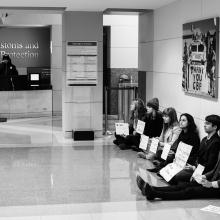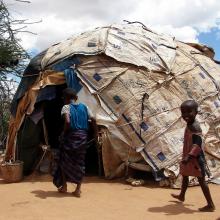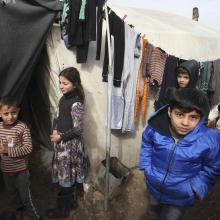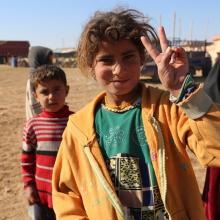Refugees

Image via Geoff Livingston/Flickr
The new language signals the Trump administration's intent to put forward an executive order that will stand.
In her sermon on the last Sunday of Black History Month, the Rev. Maria Swearingen preached about her belief that black lives, “queer lives,” and immigrant lives matter.
And since it also was Transfiguration Sunday, she pointed to the story in the Gospel of Matthew where God declared Jesus “beloved.” That is a term, she said, that can be used for everyone.

Image via Nebojsa Markovic / Shutterstock
Real people, with real stories, and real families are trembling in fear for the future of their families and, in some cases, their own lives. For those of us who follow Jesus, our faith must inform our citizenship — not the inverse. It's time for us to ask better questions, seek deeper understanding and accompany our neighbors— whether local or global — who are navigating the scariest moments of their lives.
A survey released last week by the Pew Research Center suggested a very different view of the presidential actions, especially among white Protestant Christians.
There was strong support among white evangelical Protestants, with more than three-quarters (76 percent) saying they approve of the policies outlined in Trump’s order. Among white mainline Protestants, 50 percent approved.
Many Christians now are asking the question Helena Leffingwell of Arlington, Texas – not a pastor or ministry leader, just a regular member of Gateway Church, a nondenominational megachurch – put into words: “How can we see things so differently?”

Dadaab refugee camp. Image via Bjørn Heidenstrøm/Flickr.
In Dadaab refugee camp, a researcher recorded a Somali term for the particular feeling of longing for resettlement: buufis, “a kind of depression rooted in an inextinguishable hope for a life elsewhere that simultaneously casts the present into shadow.”
Despite President Trump’s threat of a “Muslim ban” during the 2016 campaign, Hadil Mansoor Al-Mowafak, a 20-year-old international affairs student at Stanford University, was taken aback when he banned travel from seven Muslim countries, including Yemen, where her husband lives.
“I didn’t think it was even possible,” Al-Mowafak said. “I thought he just used the Muslim ban during his campaign, and once he took power he’d face reality.”
Refugees threaten to reduce us to a holy nothing. In so doing, they free us from our own selfish pursuits. And that is scary.
Instead of classifying people as refugees, immigrants, “illegal” immigrants, Muslims, Iranians, or whatever other association we use to judge people, God wants us to see humanity as fellow loved ones, children of God.
True, the executive order, which includes a restriction on travel to the U.S. for nationals of seven Muslim-majority nations for 90 days, does not directly refer to followers of Islam. But that doesn’t mean it’s not aimed at them, critics say.
Pope Francis called for greater compassion for refugees and marginalized people less than a week after President Trump ordered a temporary immigration ban from seven predominantly Muslim countries.
In other comments published Monday, Chaldean Patriarch Louis Raphael I Sako of Baghdad also said Trump’s policy of preferential immigration for Christians was a “trap” and would “create and feed” tensions with Muslims.
“We were wrong.”
That’s how former Deputy Secretary of State William Burns summarized one of the most notorious episodes in the history of American refugee policy. In 1939, the MS Saint Louis carried 937 Jewish refugees towards our shores. President Franklin D. Roosevelt’s administration denied the ship access to the U.S. and forced it to return to Europe. A third of the passengers died at Auschwitz and other concentration camps.
Most parents wonder if what they teach their children is sinking in, if the values they try to model are becoming part of their character.
Zahra’a’s parents don’t have to wonder. The first thing she did when her family received their packet of relief aid — the first aid they’d received in three years of displacement and conflict — was to turn to our staff member, whom she’d never met before, and invite him to lunch.
1. What Will You Do if Donald Trump Deports Me?
“If you are an ally, a friend, or a decent human being who understands that immigrants and refugees work hard, play by the rules and are proud aspiring Americans, then read this guide.”
2. Here’s How Franklin Graham Justifies Trump’s Expected Refugee Ban
“It’s not a biblical command for the country to let everyone in who wants to come, that’s not a Bible issue.” :thinking:
The draft text of the order, like much of Trump's campaign rhetoric, uses the language of domestic security, couched in tear of terrorism. This is dramatically out of proportion with the actual statistics on crime among immigrants and refugees, when in reality, newcomers to the U.S. commit far less crime than those born here.
“We stand in a long tradition of radical hospitality. From the underground railroad to this very day, we have welcomed the stranger, sheltered the refugee, offered safe home, resisted racism, fear, and exclusion. We will not be silent if families are torn apart, children terrified, parents detained. We are not accomplices to hate or reactionary fear. Our calling is to love and justice and faithful resistance. We will open our hearts, we will open our doors, to those who face the threat of deportation. All are welcome, period.” – The Rev. Victoria Safford, lead minister, White Bear Unitarian Universalist Church, Mahtomedi, Minn.
For the last few years Christians have been singing worship songs that include lyrics like “ keep my eyes above the waves, when oceans rise …” and yet have rejected refugees who’ve seen loved ones die beneath waves, who themselves have literally struggled to keep from drowning in oceans. Those American Christians — particularly white evangelicals — continue to sing the words: “Spirit lead me where my trust is without borders …” but fail to realize the shameful irony that they’re largely responsible for refusing shelter and opportunity to some of the world’s most helpless and oppressed people.
The deadly truck rampage through a Christmas market crowd here marked a new setback for Chancellor Angela Merkel’s hopes for political survival at a time when opposition is growing over her open-door policy for migrants.

Syrian refugees from Aleppo wait at the refugee camp in Essalame, Syria on Feb. 2, 2016. kafeinkolik / Shutterstock.com
On Dec. 14, Syrian pro-government forces breached the fragile ceasefire agreement, shelling besieged neighborhoods of Aleppo and banning civilians from fleeing. Addressing Syria, Iran, and Russia, the U.S. ambassador to the United Nations, Samantha Power, asked, “Are you incapable of shame? … Is there no execution of a child that gets under your skin? Is there literally nothing that shames you?”
Many people are still reeling from the election results and become more appalled every day with the appointments and behavior of the President -elect Donald Trump.
And many of our Sojourners readers are asking themselves and us: What can I do?
The politics going on now are indeed beyond our control — but we can control what we do with our own faith and with our own actions.














